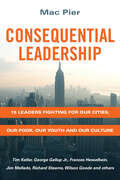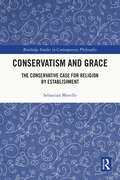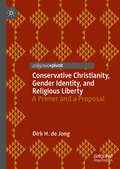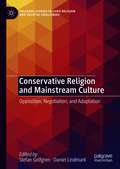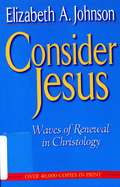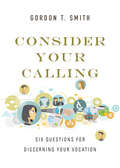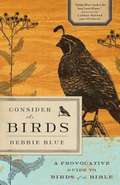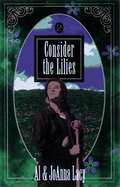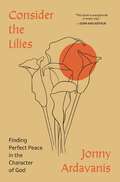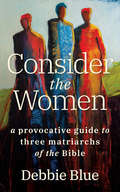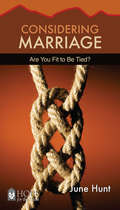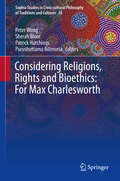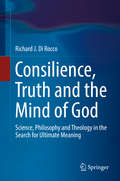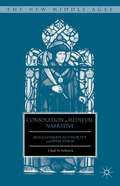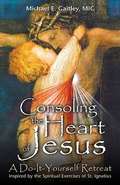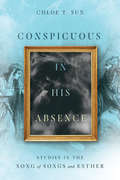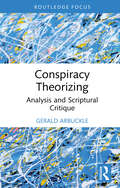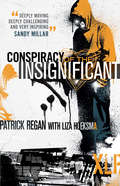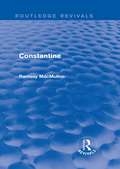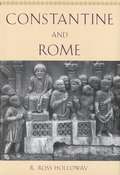- Table View
- List View
Consequential Leadership: 15 Leaders Fighting for Our Cities, Our Poor, Our Youth and Our Culture
by Mac PierAre we living in challenging times? Yes. But people can and do make a difference. Here are the stories of fifteen entrepreneurial leaders doing just that. Drawn from church, business, government and non-profit sectors, these world-class visionaries and activists offer examples that motivate and principles to imitate. Their stories show that mature networks of leaders and organizations can offer opportunities to a new generation of young people, change communities ravaged by HIV/AIDS, reach new groups of people with the message of hope--and more. If you see a need and want to contribute your own consequential leadership, this book is for you.
Conservatism and Grace: The Conservative Case for Religion by Establishment (Routledge Studies in Contemporary Philosophy)
by Sebastian MorelloThis book offers a systematic and detailed examination of the conservative case for religion by establishment. In doing so, the author demonstrates that the conservative political tradition is rooted in an inescapably religious worldview, and in turn shows what the future of conservatism might be. The author begins the book by analysing the thought of prominent proponents of secular conservatism, chiefly examining the work of Roger Scruton. The author develops a case to show that Scruton’s arguments on the privatisation of religion are in tension with his basing of a conservative political settlement on "transcendent bonds". The author then examines alternatives to secular conservatism, especially the chief religious and metaphysical commitments of early conservatives, Edmund Burke and Joseph de Maistre. Finally, in seeking to establish a foundational argument for religion by establishment within the conservative tradition, and more broadly to unify the diverse commitments and objections of conservatives, the author develops a case that draws on Scruton’s personalism, as well as the thought of Martin Buber, Andrew Pinsent, and Robert Spaemann. In the course of developing his foundational argument, the author incorporates findings from experimental psychology and themes from contemporary theology. The result is a convincing argument in favour of establishmentarian conservatism, as well as the role of religious ideas in our self-understanding as individuals and as a political community. Conservatism and Grace will appeal to scholars and advanced students interested in political philosophy, philosophy of religion, theology, and the history of conservatism.
Conservative Christianity, Gender Identity, and Religious Liberty: A Primer and a Proposal
by Dirk H. de JongThis book explores the intersection of conservative Christian values and contemporary theories and expressions of gender identity, i.e. transgender and genderqueer identities. More specifically, it examines the conflict between beliefs about religious liberty and transgender rights. It also proposes a pluralistic morality, allowing for both faith-based values and scientific discoveries about gender to resolve that conflict. Along the way, Dirk de Jong explores various contextual issues: The increase in the number of people who identify as trans or nonbinary, the differences between biblical and queer conceptualizations of gender, the impact of religious freedom policies on transgender rights, the controversy around Title IX exemptions in higher education, the emergence of trans advocacy in conservative Christian communities, and the role of dialogue in social transformation efforts with respect to gender.
Conservative Religion and Mainstream Culture: Opposition, Negotiation, and Adaptation (Palgrave Studies in Lived Religion and Societal Challenges)
by Stefan Gelfgren Daniel LindmarkThis book highlights tensions and negotiating processes between modern society and conservative religious groups. Conservative religion and society have co-existed for at least a century in an increasingly pluralist society. Still, the right to religious freedom and tolerance clashes with certain expressions of religious exclusivity. In this book, scholars from different disciplines look at the various ways in which representatives of conservative religious faith live, practice, and formulate their religion in relation to a contemporary mainstream culture. The studies included represent various settings with regard to time, religion and geography, and are presented in three thematic groups: culture, schooling and public life, and media. Taken together, the studies contribute to a more nuanced and diverse picture of conservative religious believers and their engagement with mainstream society. The book will be of interest to students and researchers in the fields of sociology of religion, church history and contemporary religion.
Consider Jesus: Waves of Renewal in Christology
by Elizabeth A. JohnsonConsider Jesus shows what a systematic theologian with a gift for language can do to unveil the intricacies of Christology at a popular level. - National Catholic Reporter
Consider Your Calling: Six Questions for Discerning Your Vocation
by Gordon T. SmithCourage and Calling
Consider the Birds: A Provocative Guide to Birds of the Bible
by Debbie BlueFrom biblical times to today, humans have found meaning and significance in the actions and symbolism of birds. We admire their mystery and manners, their strength and fragility, their beauty and their ugliness—and perhaps compare these very characteristics to their own lives in the process.Though admired today, the birds of Scripture are largely unseen and underappreciated. From the well-known image of the dove to the birds that gorge on the flesh of the defeated "beast" in Revelation, birds play a dynamic part in Scripture. They bring bread to the prophets. They are food for the wanderers. As sacrifices, they are the currency of mercy.Highlighting 10 birds throughout Scripture, author Debbie Blue explores their significance in both familiar and unfamiliar biblical stories and illustrates how and why they have represented humanity across culture, Christian tradition, art, and contemporary psyche. With these (usually) minor characters at the forefront of human imaginations, poignant life lessons illuminate such qualities as desire and gratitude, power and vulnerability, insignificance and importance—even as readers gain a better understanding that God’s mysterious grace is sometimes most evident in His simplest of creatures.
Consider the Lilies
by Al Lacy Joanna LacyPicking up where the first book in the Fort Bridger series leaves off, Consider the Lilies finds Hannah's wagon train twenty days from Fort Bridger as she deals with her children's and her own grief over her husband's death. In Fort Bridger, the Solomons make many friends. Yet there is one man, embittered by the Civil War, who hates Hannah because her husband fought on the Union side of the war, and because she is a strong woman who still plans to run the general store. In a fit of temper, this man, Alex Patterson, sets a fire that destroys Hannah's store, and seemingly her future. But just when Hannah is about to give up, she is reminded to cling to God's promises that he will provide. Soon she sees God's hand upon her life. As a result, Hannah is able to recover. . . and even lead Alex Patterson to Christ through her example of forgiveness.
Consider the Lilies
by Alfreda Oko Martin Edward MartinJapanese flower arranging has attracted a world wide following, and this book is a simple and clear introduction to the art.The first section illustrates thirty-six suggested flower arrangements with diagrams and full how-to-do-it instructions. The second part of the book explains the theory and technique of Japanese flower arrangement. The result is a book which gives an astonishing range of flower arrangements, clear explanations of how to make them at home, and an inspiring selection of devotional passages.
Consider the Lilies: Finding Perfect Peace in the Character of God
by Jonny ArdavanisFind freedom from anxiety as you lift your gaze from the problems and pressures of this world to the changeless and powerful character of your heavenly Father.Is my cancer back? Is my job secure? Will I ever get married? Are my children safe? Our lives are often a chronicle of trouble, pain, and uncertainty--and God's children yearn for peace. Many who wrestle with anxiety and despair know that the Bible calls them to "trust God," but what does that even mean?In Consider the Lilies, pastor, podcaster, and speaker Jonny Ardavanis shows us God's consistent response to those who are worn down by worry and badgered by melancholy: He proclaims His own character. Drawing on that perspective-shifting model, Jonny offers biblical insight on how to ground our thoughts and fix our gaze on who God is.Compassionate, biblical, and timely, Consider the Lilies explores:How dwelling on the character of God is the surest pathway to peaceThe root causes of anxiety and worry in the BibleWhat the Bible says about the integration of our physical and spiritual livesWhy worry grieves God's heart as our Father Consider the Lilies is for those who long for liberation from their anxiety and fear--and desire to deeply know the God they are called and enabled to trust. If you are starved for hope and gasping for peace, consider the character of your heavenly Father, who welcomes all who are anxious, fearful, and melancholy to trust in Him.
Consider the Women: A Provocative Guide to Three Matriarchs of the Bible
by Debbie BlueA timely and compelling new look at three key women in the biblical narrative Among the mostly male-dominated narratives in Scripture, the stories of women can be game-changing. In this book Debbie Blue looks closely at Hagar (mother of Islam), Esther (Jewish heroine), and Mary (Christian matriarch)—and finds in them unexpected and inviting new ways of navigating faith and life. As she sets out to explore these biblical characters who live and move in places and ways outside of the strict boundaries of tradition, Blue encounters many real life characters who challenge her expectations and renew her hope—a Muslim tattoo artist, a Saudi Arabian sculptor, a rabbi in a Darth Vader costume, Aztec dancers at a feast of Guadalupe, an Islamic feminist scholar, and more.Readers who embark with Blue on the sometimes unorthodox, subversive paths of these curious and lively figures will be led to envision more expansive and hopeful possibilities for faith, human connection, and love in our divided, violent world.
Consider the Women: A Provocative Guide to Three Matriarchs of the Bible
by Debbie BlueA timely and compelling new look at three key women in the biblical narrative Among the mostly male-dominated narratives in Scripture, the stories of women can be game-changing. In this book Debbie Blue looks closely at Hagar (mother of Islam), Esther (Jewish heroine), and Mary (Christian matriarch)—and finds in them unexpected and inviting new ways of navigating faith and life. As she sets out to explore these biblical characters who live and move in places and ways outside of the strict boundaries of tradition, Blue encounters many real life characters who challenge her expectations and renew her hope—a Muslim tattoo artist, a Saudi Arabian sculptor, a rabbi in a Darth Vader costume, Aztec dancers at a feast of Guadalupe, an Islamic feminist scholar, and more.Readers who embark with Blue on the sometimes unorthodox, subversive paths of these curious and lively figures will be led to envision more expansive and hopeful possibilities for faith, human connection, and love in our divided, violent world.
Considering Marriage (Hope for the Heart)
by June HuntWhat does the Bible say about Christian marriage? Should we get married now or wait? Are we really ready? When is the timing right? What if one of us is unsure? This mini-book, Considering Marriage, provides premarriage counseling that will help you on your journey of making the decision and preparations before you say, I do." Marriage is a beautiful covenant made between a man and a woman, so how do you know when it's right to get married? Includes Christian marriage counseling and premarital counseling questions, such as Will his quirks drive you insane? Will her weird habits become a daily annoyance? Are you becoming more confident in your direction, or less?Included in this easy-to-read marriage counseling handbook are dozens of exercises that are excellent tools for opening the door to meaningful communication. Learn what each partner's definition of love is, or their concept of the role and responsibilities of a wife and husband. These marriage quizzes will help you and your significant other maneuver through potentially tough and thought-provoking questions with ease.Get biblical answers from a Christian counselor to questions like:• Is it important to be romantically attracted to the person I want to marry?• When does age difference matter?• What is the root causes for marrying the wrong person?• What if my non-Christian parents disapprove of my Christian fiancee?• Will God stop a marriage if it's not His will?• And many more.Knowing why marriage was created and what a Christian marriage is will make life after the wedding so much more fruitful and satisfying. This christian marriage counseling guide covers the basics: More than just "tying the knot," Christians need to know--• The biblical requirements for faithfulness within marriage • Why marrying someone who is an unbeliever is a problem •And many more.
Considering Religions, Rights and Bioethics: Memorial Volume For Max Charlesworth (Sophia Studies in Cross-cultural Philosophy of Traditions and Cultures #30)
by Peter Wong Purushottama Bilimoria Sherah Bloor Patrick HutchingsThis volume engages in conversation with the thinking and work of Max Charlesworth as well as the many questions, tasks and challenges in academic and public life that he posed. It addresses philosophical, religious and cultural issues, ranging from bioethics to Australian Songlines, and from consultation in a liberal society to intentionality. The volume honours Max Charlesworth, a renowned and celebrated Australian public intellectual, who founded the journal Sophia, and trained a number of the present heirs to both Sophia and academic disciplines as they were further developed and enhanced in Australia: Indigenous Australian studies, philosophy of religion, the study of the tension between tradition and modernity, phenomenology and existentialism, hermeneutics, feminist philosophy, and philosophy of science that is responsive to environmental issues.
Consilience, Truth and the Mind of God: Science, Philosophy and Theology in the Search for Ultimate Meaning
by Richard J. Di RoccoThis book argues that God can be found within the edifice of the scientific understanding of physics, cosmology, biology and philosophy. It is a rewarding read that asks the Big Questions which humans have pondered since the dawn of the modern human mind, including: Why and how does the universe exist? From where do the laws of physics come? How did life and mind arise from inanimate matter on Earth? Science and religion have a common interest in the answers to such questions, yet many scientists and believers have been at odds for centuries. The author and contributors present a program for moving beyond the vastly different perspectives of reality offered by science and religion. Historical proofs for the existence of God are considered in light of the possibility that the universe may be only one in an eternal multiverse that contains an infinite number of other universes. Readers will find a modification of St. Augustine’s Argument from Truth for the existence of the necessary, self-sufficient being commonly referred to as God. This book is suited to all with an interest in the crossing points of science and religion, providing much food for thought and reflection. If in the end, you cannot accede to philosophy’s proofs, or theism’s invitation to faith, perhaps you will nevertheless say ‘yes’ to the amazing universe in which we live.
Consilience, Truth and the Mind of God: Science, Philosophy and Theology in the Search for Ultimate Meaning
by Richard J. Di RoccoThis book argues that God can be found within the edifice of the scientific understanding of physics, cosmology, biology and philosophy. It is a rewarding read that asks the Big Questions which humans have pondered since the dawn of the modern human mind, including: Why and how does the universe exist? From where do the laws of physics come? How did life and mind arise from inanimate matter on Earth? Science and religion have a common interest in the answers to such questions, yet many scientists and believers have been at odds for centuries. The author and contributors present a program for moving beyond the vastly different perspectives of reality offered by science and religion. Historical proofs for the existence of God are considered in light of the possibility that the universe may be only one in an eternal multiverse that contains an infinite number of other universes. Readers will find a modification of St. Augustine’s Argument from Truth for the existence of the necessary, self-sufficient being commonly referred to as God. This book is suited to all with an interest in the crossing points of science and religion, providing much food for thought and reflection. If in the end, you cannot accede to philosophy’s proofs, or theism’s invitation to faith, perhaps you will nevertheless say ‘yes’ to the amazing universe in which we live.
Consolation Of Philosophy (Hackett Classics Ser.)
by Boethius Joel C. RelihanEntirely faithful to Boethius' Latin; Relihan's translation makes the philosophy of the Consolation intelligible to readers; it gives equal weight to the poetry--in fact, Relihan's metrical translation of Boethius' metro are themselves contributions of the first moment to Boethian studies. Boethius finally has a translator equal to his prodigious talents and his manifold vision.
Consolation in Medieval Narrative: Augustinian Authority and Open Form (The New Middle Ages)
by Chad D. SchrockMedieval writers such as Chaucer, Abelard, and Langland often overlaid personal story and sacred history to produce a distinct narrative form. The first of its kind, this study traces this widely used narrative tradition to Augustine's two great histories: Confessions and City of God.
Consoler of Suffering Hearts The Life Counsels and Miracles of Eldress Rachel Visionary of Russia
by Sergiĭ LebedevConsoler of suffering hearts : the life, counsels and miracles of Eldress Rachel, visionary of Russia
Consoling the Heart of Jesus: A Do-it-yourself Retreat
by Michael E. GaitleyEndorsed by EWTN hosts Fr. Mitch Pacwa, SJ, and Fr. Benedict Groeschel, CFR, this do-it-yourself retreat combines the Spiritual Exercises of St. Ignatius with the teachings of Sts. Therese of Lisieux, Faustina Kowlaska, and Louis de Montfort. The author, Br. Michael Gaitley, MIC, has a remarkable gift for inspiring little souls to trust in Jesus, The Divine Mercy. As Danielle Bean, editorial director of Faith & Family magazine, puts it, "The voice of Christ in these pages is one that even this hopelessly distracted wife and mother of eight could hear and respond to." Includes practical helps an in appendices. The book features the diary of St. Faustina, the nun who gave us through Jesus, the chaplet of mercy. Sometimes the book is hard to read, but one needs to read and meditate on one section at a time.
Conspicuous in His Absence: Studies in the Song of Songs and Esther
by Chloe T. SunIn the biblical canon, two books lack any explicit reference to the name of God: Song of Songs and Esther. God's peculiar absence in these texts is unsettling, both for theological discourse and for believers considering implications for their own lived experience. Chloe T. Sun takes on the challenges of God's absence by exploring the often overlooked theological connections between these two Old Testament books. In Conspicuous in His Absence, Sun examines and reflects on the Song of Songs and Esther using theological interpretation. She addresses three main questions: What is the nature of God as revealed in texts that don't use his name? How do we think of God when he is perceived to be absent? What should we do when God is silent or hidden? The experience of God's absence or silence is an important part of the human condition. By exploring the distinct themes and perspectives of Song of Songs and Esther, as well as how they've been received in Jewish and Christian history, Sun demonstrates how both books serve as counter texts to the depiction of God and his work in the rest of the Hebrew Scriptures. Thus both contribute to a fuller picture of who God is and what it means to know him.
Conspiracy Theorizing: Analysis and Scriptural Critique (Routledge Focus on Religion)
by Gerald ArbuckleConspiracy Theorizing explore how should individuals with the Christian faith should react to conspiracy theories, their untruths, and their dangers. This book outlines the way that conspiracy theories are the fundamental basis for this stigmatization and scapegoating. It goes further to explain that scapegoating is fostering extreme divisions within in societies and between nations with each side often demonizing the other.This book states how conspiracy theories satisfy people’s needs for certainty, security, and a positive self-image in a world they feel is disintegrating. Uncovering deeper, when the comforting securities of cultures crumble, paranoia makes sense. This book demonstrates that an inability to live with uncertainty and ambiguity draws people to conspiracy theories when they validate their apprehensions. The commentary in this book also validates that since conspiracy theories can never be verified by objective research and truths they are one of the most problematic subjects to expose.This book aims to answer these questions: What are conspiracy theories? Why do they arise, especially in times of cultural upheavals? Are they harmful? What do the Christian Scriptures say about them? Readers that are interested in religion, Christianity and conspiracy theories would enjoy this book.
Conspiracy of the Insignificant
by Patrick ReganPatrick Regan grew up in a nice, quiet, middle-class Christian family. So he got something of a culture shock when he spent two weeks doing a mission in London at the age of 16. Having met people from violent backgrounds and living in cardboard boxes with no food, no money and no security, Patrick prayed a life-changing prayer: that he would see things the way God sees them.Soon Patrick was back in London working in schools in some of the most socially deprived areas, Patrick and his growing team slowly but surely earned the right to share the gospel. When the tide of violence began to rise, Patrick was there to provide the Christian presence so desperately needed. This book tells the story of a journey that took Patrick everywhere from the roughest estates in London to Jamaica's Trenchtown and to poverty stricken villages in Ghana. Through it all he learnt that bringing the kingdom of God to a place can mean anything from helping a child to read to negotiating between gang leaders.
Constantine (Routledge Revivals)
by Ramsay MacMullenThis study, first published in 1969, presents an astute and authoritative depiction of the cultural, religious and secular developments which shook the Roman world in the late 3rd and early 4th centuries AD, much of it under the auspices of the Emperor, Constantine the Great. Constantine was at the heart of the transition from pagan antiquity to Christendom. Rejecting the collegiate imperial system of his recent predecessors, he reunited the two halves of the Empire; established Christianity as its formal religion; and shifted the capital of the Roman world definitively to the city which would survive the collapse of the West and persevere for another thousand years, Constantinople. The general reader will enjoy Constantine as a lucidly composed and accessible synthesis of ancient sources and modern contributions to the study of this towering figure.
Constantine and Rome
by R. Ross Holloway"Constantine the Great (285-337) played a crucial role in mediating between the pagan, imperial past of the city of Rome, which he conquered in 312, and its future as a Christian capital. In this book, R. Ross Holloway draws on archaeological evidence to examine Constantine's remarkable building program in Rome, describing a cityscape that was at once Christian and pagan, mirroring the personality of its ruler. " "Holloway begins by examining the Christian Church in the period before the Peace of 313, when Constantine and his coemperor Licinius ended persecution of the Christians. He then focuses on the structure, style, and significance of important monuments. He discusses the Arch of Constantine, suggesting that it was begun by Constantine's predecessor Maxentius but finished, with modifications, for the new emperor. He looks at the basilicas of the Constantinian period, including St. John's in the Lateran and St. Peter's, and the imperial mausoleum and basilica at Tor Pignatara on the Via Labicana, which he contends is one of the most innovative complexes in the history of Western architecture. Holloway next surveys the Christian cemeteries of the period and reviews evidence for adaptation of pagan buildings to Christian worship. In a final chapter Holloway advances a new interpretation of the archaeology of the Tomb of St. Peter under the high altar of St. Peter's basilica. The tomb, he concludes, was not the original resting place of the remains venerated as those of the apostle but was created only in 251 by Pope Cornelius. "--BOOK JACKET. Title Summary field provided by Blackwell North America, Inc. All Rights Reserved
